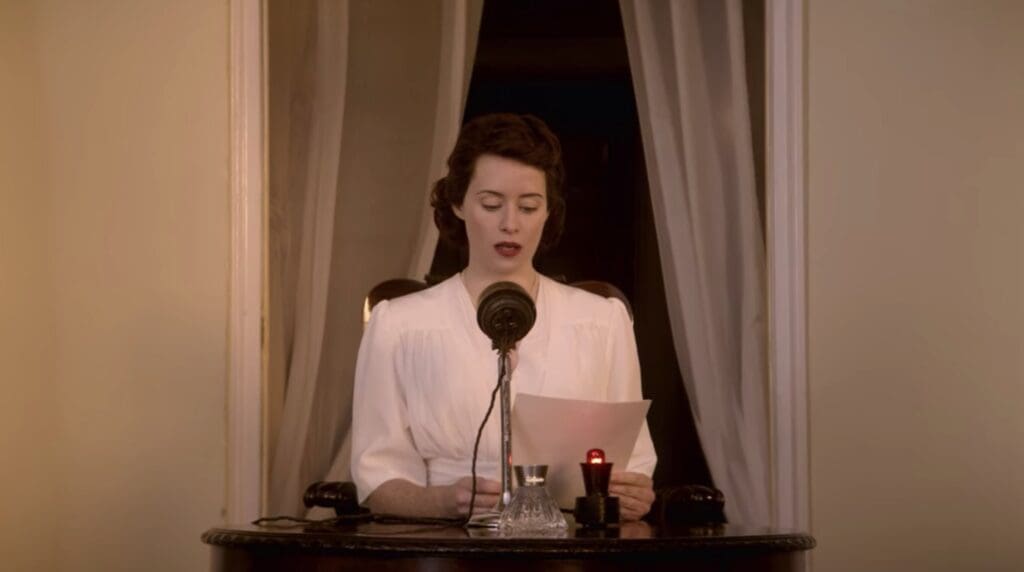Summary
This may not be the most explosive chapter in the Netflix series. Still, “48:1” is incredibly insightful, highlighting a strained relationship between Queen Elizabeth and Prime Minister Margaret Thatcher. The tensions in the episode and the consequences that followed make for an excellent 50 minutes.
This recap of Netflix’s The Crown season 4, episode 8, “48:1” contains significant spoilers.
We recapped every episode — check out the archive.
The opening
It begins in Cape Town, South Africa in 1947. The Queen gives a speech on her 21st birthday. She talks about how Commonwealth hosts many homes and brings up the hardships and sacrifices that were a result of the war. She finishes with the prospect of making the Commonwealth grander, freer and more prosperous. While she finishes her speech, it shows a young Margaret Thatcher growing up and graduating. “48:1” shows an unprecedented tension that brews between Thatcher and the Queen.
The Queen does not express her views
The next scene shows the Queen’s press secretary Michael Shea finishing a new book; as he goes into work, he’s asked if the Queen disapproves of Thatcher’s stance on the sanctions due to the Apartheid policies in South Africa. Michael is the Queen’s press secretary. He refuses to answer, stating that the Queen doesn’t get involved in Prime Minister’s actions. As we know, this is always the reply by the crown — the monarchy does not involve themselves in political opinion.
Margaret has her views
Margaret Thatcher tells her cabinet members that she believes the Commonwealth is a waste of time and does not understand the Queen’s relationship with South Africa. The start of the episode shows how there is tension before the two women meet on this issue.
Thatcher and the Queen do not see eye to eye
Elizabeth visits South Africa and gives a speech to the Commonwealth. She talks about celebrating differences and healing divisions. On a ferry, Prime Minister Thatcher and Elizabeth discuss South Africa and the Apartheid regime. The Queen is for the sanctions. Thatcher is against it because she feels South Africa is disinvestment. Elizabeth is thinking about the Black South Africans — both women do not seem to be able to agree with Thatcher not feeling the Commonwealth is a solution. It feels like Thatcher’s opinions of the monarch and the Commonwealth is beginning to surface while the Queen is tempted, for the first time on the throne, to display an opinion on a contentious issue.
The back and forth statement
The pair continue to bicker, but the Queen asks Thatcher to sign the statement for sanctions. Thatcher believes the Queen is making a directive. Afterwards, Thatcher keeps rejecting statements based on words like “Sanctions”, “Proposals”, “Measures”, “Actions” or “Control”. The statement goes back and forth. The Queen wants to use a writer to pass the statement through Thatcher. She asks Michael Shea to write the statement. He changes the keyword to “Signals”, and Thatcher accepts the statement.
Afterwards, Thatcher gives a press conference, and she believes that her concession to the statement was not a big one — she states how a “Signals” can be turned which irks acquaintances and then Queen. This really is a tasty political battle.
Elizabeth is asked to vocalise her support for Downing Street
As for Michael Shea, his publicist tells him he has no offers yet on his book, but she compliments him on the fact that he can tell a story — she asks if he has considered a political thriller. Michael doesn’t like the idea and wants to stick to the magnum opus.
Michael learns that the media are reporting on the sour relations between Buckingham Palace and Downing Street due to increasing tensions amongst the Commonwealth and South Africa. Adviser Martin and Michael recommend to the Queen to vocalise her support for Prime Minister Thatcher. Elizabeth suggests she doesn’t support the Prime Minister on this issue and she wonders if for once she can stand up for what she believes in. They warn her that this could cause irreparable harm between Buckingham Palace and Downing Street; however, as it is the Queen, they give her options to where the crown’s opinion can be published. Michael and the adviser warn strongly against this and put it on record.
The whole concept that the Royal Family cannot have an opinion on matters is fascinating — it shows how the modern monarchy is merely furniture of the land and a funded head of state but nothing more.
The sensational news is released
The Sunday Times reveals a sensational rift between Buckingham Palace and Downing Street — it states the Queen’s disapproval at Thatcher’s refusal to approve sanctions against South Africa. Thatcher tells her husband Denis that she feels impatient to see her again. Philip reads the paper to Elizabeth, and she doesn’t look entirely happy.
She knows this is going to cause a media storm.
An audience with the Queen
Elizabeth and Thatcher meet at the Palace. Thatcher expresses how the Queen has broken a code where she discusses political matters. Elizabeth tries to back out of the issue, but Thatcher knows that she approved the reports in The Sunday Times and refuses to allow the conversation to escape. What’s funny about this conversation is that an audience with the Queen is always short, even for the Prime Minister, but you can tell Thatcher is well-prepared to get her points across quickly.
Thatcher’s responsibility
And so she does with stern and coldness; Thatcher starts reading from the newspaper about what the crown has said about her government — how she is “Uncaring, confrontational, and socially divisive. That I lack compassion. And that my government has done irretrievable damage to the country’s social fabric”. Thatcher brings up that it’s her responsibility to serve the country and not to reduce to sentimentality — she wants to change the country from dependent to self-reliant. She reminds the Queen that she came from a small town, not her. This was a cracking point to be fair — while the Queen grew up with wealth, Margaret Thatcher grew up in different circumstances and not detached from the world. But still, does this not grant the Queen an opinion?
The Queen asks Margaret Thatcher why she couldn’t have supported her for once at the Commonwealth; she states how her international acquaintances feel she has betrayed them — there’s a rush of blood running through the Queen as she says this; her time wth Prime Ministers are usually simple and straightforward. As Thatcher leaves, you can feel the anger resonating from the screen from both women. The Queen is absolutely fuming as Thatcher talks about the upcoming wedding for Prince Edward to close the conversation.
The wedding is second place
Prince Edward is irritated that his wedding is not popular in the media due to her mother’s dispute with Margaret Thatcher — he’s showing his privilege and self-entitlement. Charles raises how his mother is doing the one thing she told him not to do — have an opinion, and he is coy about it; it’s almost like he’s proud of his mother. He also reminds Edward how further down in the Royal pecking order he is and tells him he is on the fringe. The wedding is second place on the news. The media says the Queen has made an error of judgement.
The ending
Elizabeth’s advisor Martin tells the Queen that they need try and deflect blame from her as denial is not working anymore — they need a name. Martin blames Michael Shea, and he asks the author to do the right thing. This is a man who has served the Queen for years and dedicated his career to her. He accepts taking the blame, but he looks upset. We are witnessing a moment where the Queen has an opinion for once, and this was the result — a man who was respected losing his job. The episode ends with the text:
“The Palace continues to insist that the Queen has never expressed an opinion or passed judgement on any of her Prime Ministers.
Michael Shea went on to have a successful career as a best-selling author of political thrillers.
In 1994, Apartheid fell and Nelson Mandela became the first black president of South Africa. When asked where sanctions helped bring an end to Apartheid, he replied, “Oh, there is no doubt”.
This may not be the most explosive chapter in the Netflix series. Still, The Crown season 4, episode 8 is incredibly insightful, highlighting a strained relationship between Queen Elizabeth and Prime Minister Margaret Thatcher. The tensions in the episode and the consequences that followed makes for an excellent 50-minutes.



